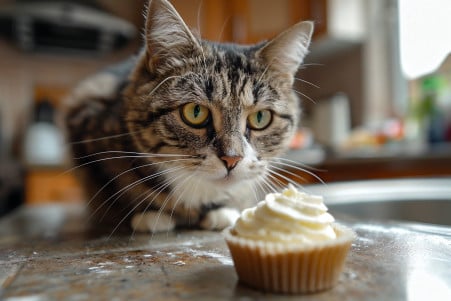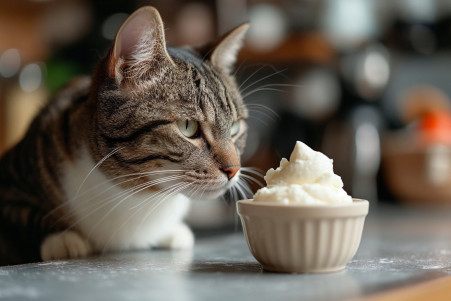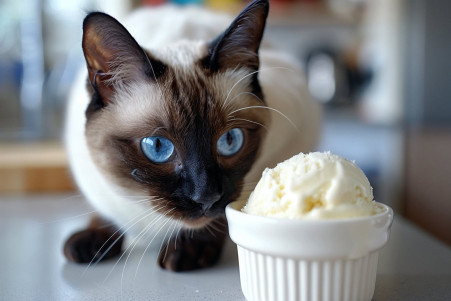Can Cats Have Sour Cream? An In-Depth Review
19 April 2024 • Updated 17 April 2024

Although there are some nutritional benefits to cats eating sour cream, there are also some important things to note about the fat content, lactose intolerance, and the importance of feeding it in moderation. Cats can eat sour cream as a rare treat, but it should not be a regular part of their diet due to the potential for weight gain and digestive issues.
This article will review the most up-to-date information from veterinarians and feline nutrition experts to give you a thorough understanding of whether or not sour cream is a safe treat for your cat. This summary will cover the potential positives and negatives, such as how it can impact your cat's digestive health, weight, and nutritional requirements at different life stages. With this information from scientific studies, you can better understand how to approach your cat's diet.
Can cats have sour cream?
Feline Lactose Intolerance
Most cats are lactose intolerant as adults because they stop producing the enzyme lactase, which is necessary to break down lactose in milk. For lactose intolerant cats, consuming dairy products like sour cream can result in gastrointestinal upset that causes vomiting, diarrhea, gas, and stomach pain.
Although kittens can easily digest their mother's milk, many cats become lactose intolerant as they age and their lactase production decreases. The severity of lactose intolerance can differ from cat to cat, so it's important to introduce sour cream and other dairy products slowly and carefully and to monitor cats for negative reactions.
Even a small amount of lactose can cause stomach upset in cats that are lactose intolerant. Therefore, it's best to start with a small amount and gradually increase the serving size while monitoring for signs of intolerance. If you do this, you may find that your cat can have a little sour cream as a treat from time to time.
Nutritional Value and Potential Benefits of Sour Cream for Cats
Sour cream has some protein, vitamins, and minerals that may have some nutritional value for cats if it is fed in small amounts. The fat in sour cream can also be a source of energy and may help with skin and coat health. In addition, sour cream can help cover up bad tastes when giving medicine to cats that are picky eaters.
That said, it's important to remember that sour cream by itself isn't a complete or balanced food for cats, who are obligate carnivores. Any benefits of feeding sour cream to cats are far outweighed by the potential problems of feeding it to them in large amounts, as it is high in fat and calories, which can lead to obesity and other health problems.
Dangers and Side Effects of Overfeeding Sour Cream to Cats
Overfeeding sour cream to cats can result in obesity and the health problems that come with it. Per Bond Vet, the high fat and calorie content in sour cream can even lead to diabetes and pancreatitis. Moreover, overconsumption of dairy products can lead to gastrointestinal issues, dehydration, and malnutrition.
Sour cream can also contain preservatives like gums, sweeteners, and artificial flavors that are toxic to cats. According to Citrus County Vets, signs of sour cream poisoning in cats include vomiting, diarrhea, lethargy, and loss of appetite. Even a small amount of sour cream-based dip can be dangerous, as JustAnswer pointed out the toxicity of onions and garlic in these products.
It’s important to feed sour cream to cats in moderation. Cat owners should watch their pets closely for any signs of gastrointestinal upset or other negative side effects. It’s also a good idea to talk to a vet before giving cats sour cream or any other human food.
Safer Options and Healthy Snacks for Cats
Although sour cream is not the best choice for your cat, there are plenty of other options that are safe and healthy and can be used as an occasional treat. WebMD states that cooked, unseasoned meats like chicken, turkey, and fish are great sources of protein that can be given to cats in moderation. Small amounts of certain cooked vegetables like spinach, broccoli, and green beans can also offer fiber and important nutrients.
For a more well-rounded treat, VCA Animal Hospitals suggests going with commercial cat treats that are made with feline nutritional needs in mind. Catnip, cat grass, and freeze-dried meat treats are also options that can meet your cat's needs without the potential dangers of human food. No matter what treats you decide to give your cat, make sure to introduce them slowly and in small amounts to prevent stomach upset.
How to Safely Introduce Sour Cream and Other New Foods to Cats
If you decide to give your cat sour cream or any other new food, it's important to introduce it slowly over the course of 7-10 days, according to PetMD. This means that you should start by mixing a small amount of the new food (in this case, sour cream) with your cat's regular food and then gradually increase the amount of the new food over the next several days while watching for signs of digestive upset, such as vomiting and diarrhea.
According to Royal Canin, it's best to use a specific transition plan, like 75% old food and 25% new food on days 1-2, 50% old food and 50% new food on days 3-4, and so on until you're feeding 100% new food on day 7. This slow transition can help prevent stomach upset and neophobia, or a cat's natural aversion to new foods.
It's also important to make sure that your cat is in a calm, stress-free environment while you're transitioning their diet, according to Hill's Pet. If your cat has any health issues, it's a good idea to talk to your vet before introducing any new foods since they may have specific dietary needs. By following these guidelines, you can help make sure that your cat has a safe and comfortable experience when you introduce sour cream or any other new food into their diet.
Conclusion: Feed Your Cat Sour Cream in Moderation
Sour cream is made from cultured cream, which contains caseins and whey, the two primary proteins in dairy. It is made by fermenting cream with lactic acid-producing bacteria. Processed sour cream typically includes a number of additives like guar gum, sodium phosphate, sodium citrate, carrageenan, calcium sulfate, potassium sorbate, locust bean gum, and sweeteners, including xylitol. Xylitol is poisonous to cats and should never be included in their diet.
Sour cream is safe for cats in moderation, but it should only be given as an occasional treat in small amounts in addition to a cat's regular diet. Sour cream also contains several nutrients, including Vitamin K, Vitamin A (in retinol form), riboflavin (Vitamin B2), calcium, and phosphorus. However, before giving your cat sour cream, be sure to check the label to make sure it doesn't include any harmful chemicals, preservatives, or sweeteners like xylitol.
Cats are obligate carnivores, which means they need a diet that's primarily made up of meat. The low protein content of sour cream means it doesn't provide the nutrition cats need. In addition, the high fat content makes it inappropriate for regular consumption and could lead to obesity in cats. For cats that are lactose intolerant, sour cream can cause stomach upset and other digestive issues. While sour cream isn't poisonous to cats, there's no reason to feed it to them unless your vet recommends it.
Instead, focus on feeding your cat a well-balanced, meat-based diet that meets their nutritional needs. Talk to your vet about the best treats for your cat and how much of them you should feed. Look for healthy alternatives to sour cream that are safe for cats to eat.


